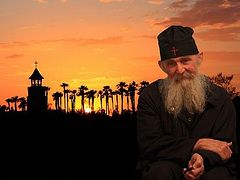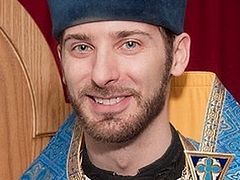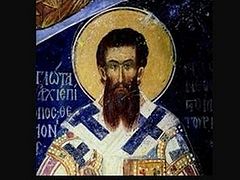Few people like to live in their own time period. “I was born in the past,” they say, “in those times with refinement in a royal court, with long dresses sweeping the floor during a candle-lit minuet.” Of course, few imagine themselves as a serf in the barn.
But one way or another, illusions of better times that have sunken into something are present. The temptation arises in the form of a question: Where should we return? Which era should we restore?
And what actually are our options?
Rus’ before Peter the Great, Peter the Great’s Russia after the Petrine Reforms[1], the Soviet days, and so forth.
All these epochs have their own semantic core. Rus’ before Peter the Great ideally speaking, sought for national holiness. Peter the Great’s Russia aspired for the greatness of the state. The Soviet Union wanted social justice. These three positive core issues were noted by His Holiness the Patriarch, when in one of his sermons, he analyzed our historical path.
The only thing is you can’t go back there, and not only there, you can’t go back to anywhere [in time]. And if it were possible, then you’d have to say: It’s not necessary! We don’t need to return anywhere!
It’s impossible to return to a sort of “Russian Sharia”, the so called Domostroy[2]. The Domostroy is a good book, especially for its time period. It talked about how to salt mushrooms, how to receive guests, how to store firewood for the winter, and all with faith. It was beautiful!
But to write a new comprehensive guide for the Christian way of life in the era of supermarkets and microwaves is an endeavor that is doomed to fail. An immensely complicated life does not lend itself to strict detailing.
To return to the Petrine paradigm would be suicide. There were indeed victories there, but mostly those of the army, the fleet, architects, writers, and diplomats. But the Church in this epoch, I am afraid, has no victories to speak of.
There were isolated examples of sanctity: St. Dmitry of Rostov, St. Joasaph of Belgorod, or the holy fathers of Optina Monastery. But the Church as a whole was overwhelmed with bureaucratic red tape, accustomed to ministerial behavior, intimidated by the reprimands of various chanceries, and burdened with obedience to state interests. Then, in its fatal and fateful moment, it was lead out to be shot [by the Bolsheviks] for the “sacralization[3] of an anti-human regime. ”
And as for the Soviet Era, the church life of this, “ghetto” which was so dear to some people, isn’t compatible with today’s issues. This very “survival mode” is unacceptable for our times, which call for broad creation and renewal. In general, there is nowhere to return to.
All three epochs have their own name, if you think about it: the rule of religious rites, the rule of superficially religious powers, and the rule of cannibalistic ideals of world happiness without any regard for religious life.
There’s nowhere exactly to return.
But there is an opportunity to revive a pastoral message, which would be considered:
a) Under the Domostroy [Old Rus’.—Trans.]—not held in high regard today
b) Under Peter the Great—considered suspicious
c) Under the Soviets—prohibited
Today, in this regard, there is freedom. It’s a risk worth taking. This is a moment of unexpected freedom for the clergy. The Clergy is no longer a guardian of antiquities, a subject of the tsar, or a hostile element, as in the three previously mentioned eras. The clergy is more than that. The eternal problem is in that we are not prepared. Generals, they say, always prepare for the previous wars. The problems of bygone years now cloud the tasks ahead for the present day.
So here is what we can do. Return to the archaic, serve to strengthen the state, or simply survive, where it is most convenient. Taste and see for yourself who got mired down in what. And the people in the meantime thirst for a refreshing word.
Notice how talkative our era is. TV debates, political shows, parliament speeches, rallies, movies, the theater, and so forth. There is an excess of oratorical activity. Now it’s up to us.
There is such a concept as “sacred liquids”: water, wine, milk, and honey. This is a sort of analog to the four rivers flowing from paradise. Water to live, wine to make glad the heart of men, honey to sweeten, and milk to strengthen. These are all present in a sermon.
Water, it simply represents communication. People want to be spoken with, for the Bishop to be available as a shepherd, and not as a high official with reception hours. Water is a conversation, on a variety of subjects in the spirit of human togetherness.
Wine is Dogma. This is the revelation of the meanings of feast days and the readings from the Scriptures on special days. Here there is no need to simply chat. Here, it is necessary to speak like Moses from the mountain, with joy and authority. It is necessary to proclaim the profound truths revealed by God, which do not lend themselves to discussion. Such knowledge makes the soul rejoice with the gladness of that which is Divine. Blessed is the man who knows how to give such a drink to the people.
Honey, this is a parable, a cautionary tale, an experience from life. This is what edifies, what makes merry. You can not always be so tense. There is not a sign [of the typical.—Trans.] of strict fasting on every day of the year. Sometimes, this is a sign of an untreated condition, let’s say, melancholy, or misanthropy. Look at how sometimes the Elders rejoiced. They knew how to joke, driving away from people the gloom of the demon of melancholy. Ambrose of Optina, Gabriel of Samtavro, and others. That was honey!
And milk, this is practical moral food for spiritual younglings. This is not simply saying “don’t steal”, “Don’t swear,” “don’t waste money”. Rather, this means explaining why you can’t take what doesn’t belong to you, why you shouldn’t remember offenses and keep grudges, and why you can’t be envious. This is accessible, practical advice of life for simple people.
Obviously, for “water” you simply need to be human[4]. For “wine” you need to be a human who is at one time both educated and prayerful. For “Honey”, you need to be someone who has lived life, and despite a suffering heart, is still able to smile beautifully and warmly. For “milk”, you need to be the practical leader of an ever-loquacious herd, practical, and not a dreamer.
All of this can unite, and can be united only in the Bishop. The remainder is an exception. Burdened with many affairs and papers, the Bishop, regardless what one may say, must still be similar to those, who we call “Our Father(s) among the Saints”. These are Basil the Great, Gregory the Theologian, and John Chrysostom. And not only them, but they are among the noteworthy. Yes, you could call this era “where to escape” if you want. Let’s escape to the era of the great Cappadocians.
There were many heretics running around (as in our times), and church schisms multiplied. Authority was not constant. There were those who patronized, then chased others down like a rabbit in a hunt. People were confused and intimidated. (All of that as in our times). Paganism had not disappeared (it was still around in their time, and in our time it has been revived). The universe is in turmoil.
But they preached day and night. They entered a Church, and people sung a psalm—there was a conversation about the psalm that was sung. This we find with Saint Basil. They read the Gospel – there was a conversation about what was read. This we find with Saint John. We are fed by the fruits of their labors to this very moment! Children should be like their fathers; and if they are “Our Fathers Among the Saints”, then we should continue their work in quality and approach.
Let’s go back to the time of the broadscale Church sermon. It sounded regardless of the authorities, despite the pagans, and against the heretics. Of course, it was despite weakness and unworthiness, but it still sounded!
We say: “Well…you know…I’m not Chrysostom.” So? He could have said, “Well…you know…I’m not Paul.” He did not, however. He did not hide behind secretaries and cell-attendants[5]. He did not burn away his lifetime at feasts with the famous. He went into the good fight and in the end, he won. He is our Father. We look as children unto their father, and we go forward to our work.
We in Rus’ have never had more favorable times for preaching! The benefit of a generally literate populace is working to our advantage (it was never like that before). The absence of an obviously God-fighting press is working in our favor. Our general education is working to our benefit. They’ve traveled the whole world, they’ve read all the books. The existence of new communication connections is also in our favor. We have so many positives, that a resurrected St. Basil the Great would cry “Why don’t you recognize the benefits of your time?! Why don’t you enter using the wide-open door?!” And if St. Nicholas of Myra were beside him, he would have given us all a slap in the face for laziness and unbearable guile. And as always, he would have been right.
It is necessary to return to (if we return) to the era of the Fathers—before it is too late, before the door is closed. This is the only era that is worth trying to return to, not in its entirety—because that’s impossible—but in principle, because this is very necessary.






